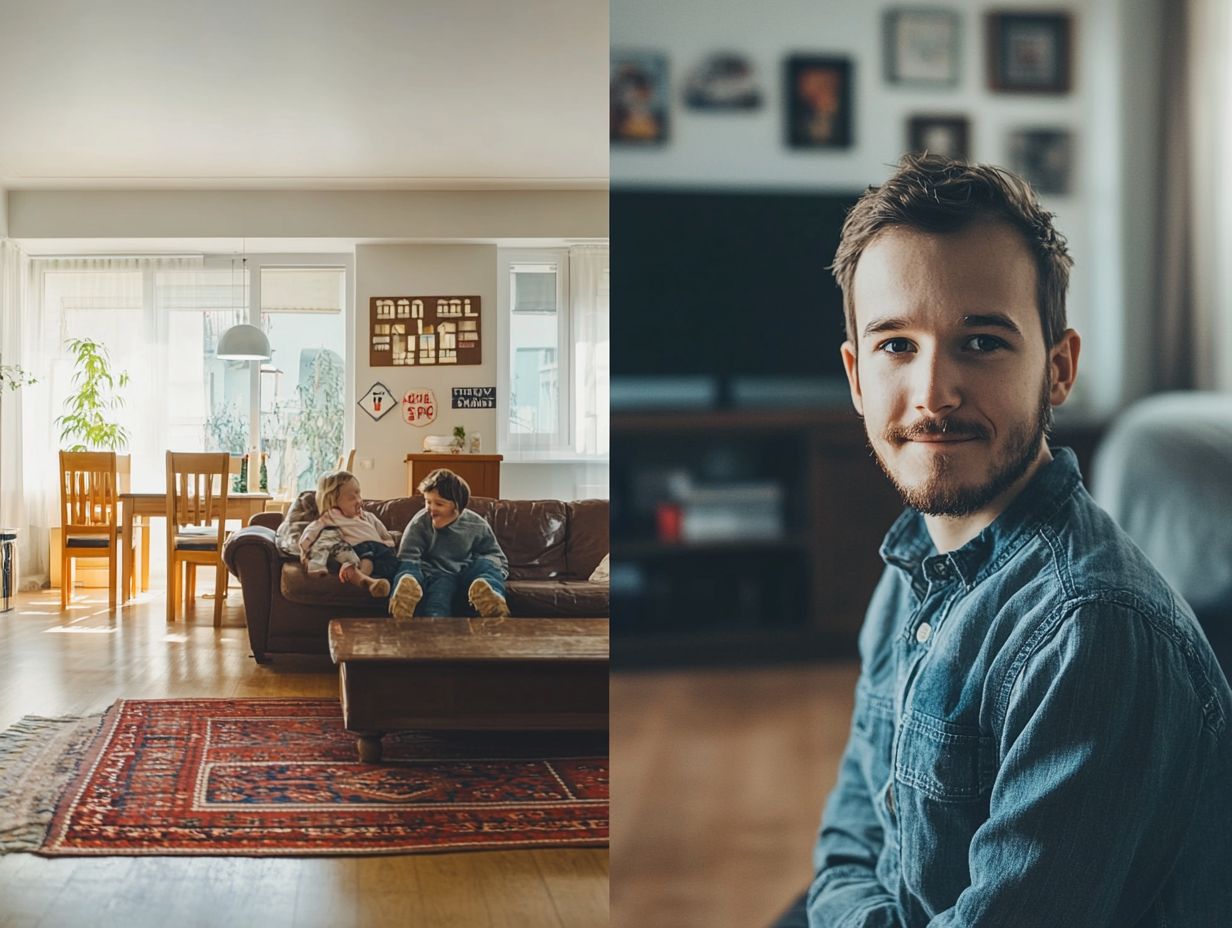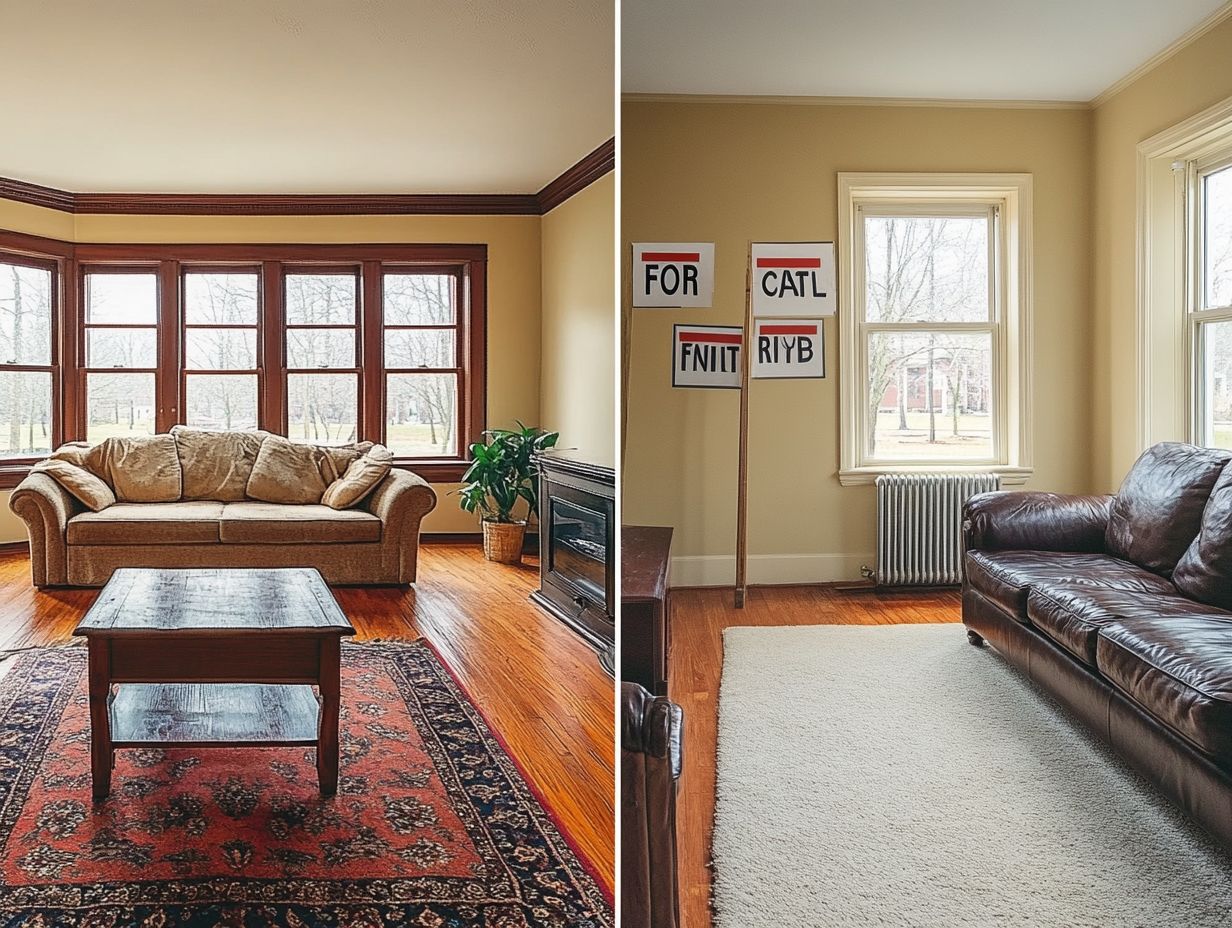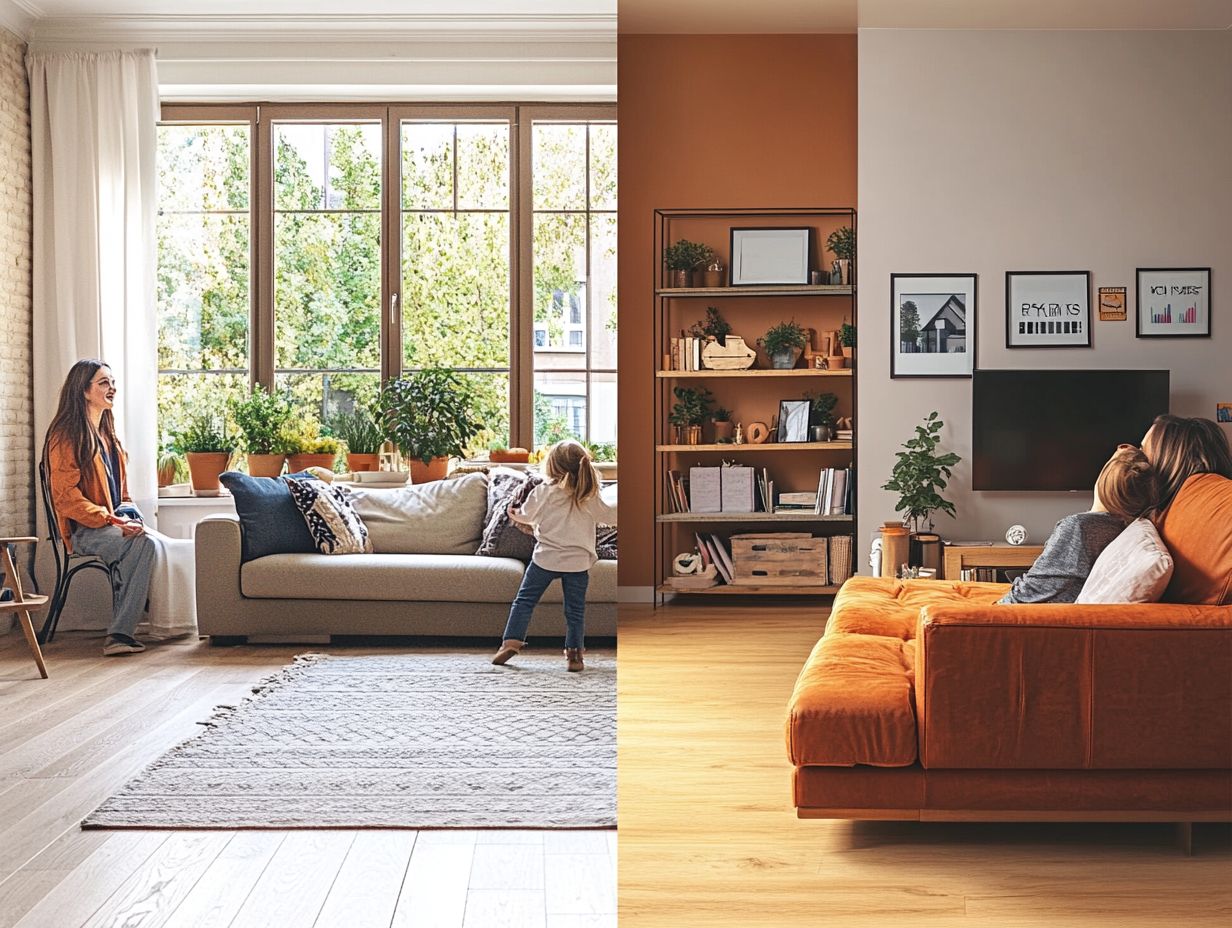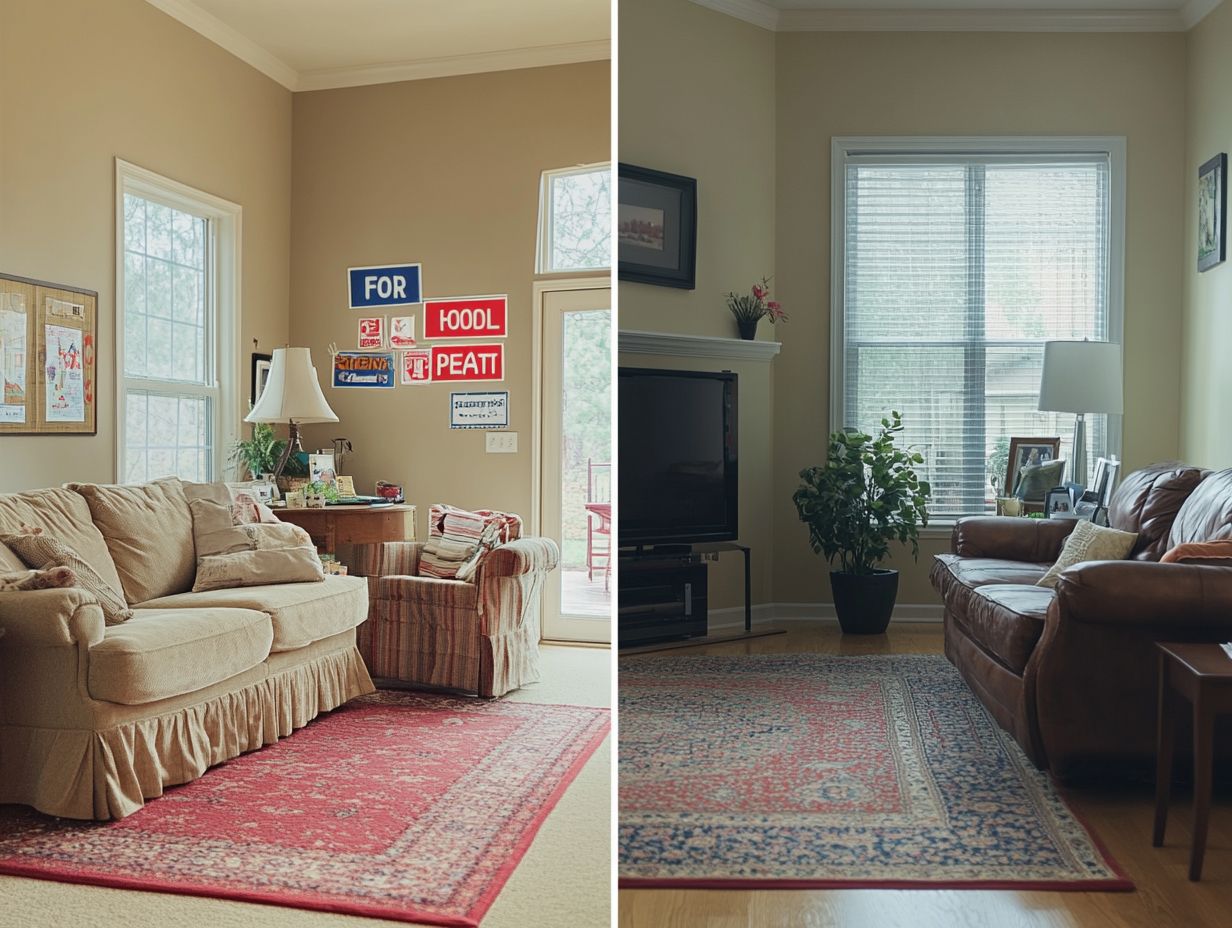The Benefits of Buying vs. Renting
Deciding whether to buy or rent a home is a crucial decision that will shape your finances, lifestyle, and future.
Each option presents its own unique advantages and challenges. While buying a home can offer you long-term stability and financial rewards, renting provides the flexibility and lower upfront costs that many find appealing.
This article delves into the key differences between buying and renting, highlighting essential factors for you to consider based on your individual circumstances. It will help you evaluate your priorities, empowering you to make the best decision tailored to your needs.
Contents
- Key Takeaways:
- Explanation of Key Differences
- Advantages of Buying a Home
- Advantages of Renting a Home
- Factors to Consider Before Buying or Renting
- Making the Decision: Buying or Renting?
- Frequently Asked Questions
- What are the benefits of buying a home compared to renting?
- Are there financial benefits to buying a home instead of renting?
- What are the advantages of renting instead of buying?
- Can renting ever be a better option than buying?
- How can buying a home provide stability compared to renting?
- Are there any potential drawbacks to owning a home instead of renting?
Key Takeaways:

Buying a home can build equity and offer tax benefits. Renting offers flexibility and lower upfront costs. Understand your financial situation before making a choice.
Explanation of Key Differences
Understanding the critical distinctions between buying and renting a home is essential, as these choices can profoundly influence your financial stability, lifestyle preferences, and future investments.
While purchasing a home offers advantages like increased property value over time and greater control over your property, renting affords you flexibility and lower upfront costs, allowing you to adapt more easily to changing circumstances.
Many factors influence your decisions, including property taxes, maintenance expenses, and available community amenities, all of which play a significant role in determining the overall market value of both homes and rental properties.
Advantages of Buying a Home
Purchasing a home provides you with an array of advantages, particularly in terms of financial benefits and long-term stability.
As a homeowner, you have the opportunity to build equity over time, unlocking significant investment potential as your property appreciates. Owning a home gives you the power to make customizations and renovations, granting you a sense of control over your living space.
Owning a home comes with exciting tax perks that renters often overlook, such as deductions for property taxes and mortgage interest.
Financial Benefits
One of the primary financial advantages of purchasing a home is the opportunity to build equity over time. As you make your monthly mortgage payments, you re not just covering expenses; you re actively transforming those payments into a valuable investment instead of tossing money into rental costs with no return.
With each mortgage payment, a portion reduces the principal balance, gradually increasing your equity in the property. Additionally, property values tend to appreciate over time, further bolstering your net worth.
While you ll need to factor in costs like property taxes, homeowners insurance, and maintenance, these expenses are often outweighed by the potential rise in your home s value. Renting ties you to fixed payments that offer no opportunity for financial growth, highlighting the long-term benefits of homeownership over the unpredictability of the rental market.
Long-Term Stability
Long-term stability is one of the most compelling advantages of homeownership. As a homeowner, you enjoy the peace of mind that comes with consistent mortgage payments and the potential for your property’s value to appreciate over time.
This financial predictability sharply contrasts the uncertainties of fluctuating rents, which can change annually and often rise, leaving renters grappling with financial instability. Such stability cultivates a genuine sense of belonging within your community, prompting you to invest in local schools, parks, and events.
Over time, the relationships you develop with neighbors significantly enhance your quality of life, fostering a supportive environment that renters may not fully experience. Ultimately, this long-term investment not only provides economic benefits but also nurtures a vibrant community spirit and resilience.
Advantages of Renting a Home

Renting a home offers numerous advantages. These include flexibility and lower upfront costs, making it an appealing choice for many individuals navigating the rental market.
This option provides you with the freedom to adapt to changing circumstances while minimizing financial burdens. This allows you to focus on what truly matters in your life.
Flexibility and Lower Upfront Costs
The flexibility that comes with renting is unmatched. It enables you to adapt your living situation as life changes without the long-term commitment that homeownership demands.
This adaptability is invaluable, especially when unexpected opportunities or challenges arise. These could be a new job, shifting family needs, or changing personal preferences.
As a renter, you’ll enjoy lower upfront costs. Think smaller security deposits instead of the initial money you pay when buying a home, making your transition much smoother.
Unlike homeowners, you won’t be weighed down by mortgage-related expenses, repairs, or maintenance fees that can pile up over time.
By choosing lease agreements, you can strategically manage your financial commitments. Engage only in payments that suit your current situation, fostering a lifestyle that emphasizes mobility and financial freedom.
Factors to Consider Before Buying or Renting
When contemplating whether to buy or rent, you need to weigh several factors. Your personal financial situation and the current market landscape play pivotal roles in determining your housing expenses.
Thoughtful analysis of these elements will guide you toward the most prudent decision for your circumstances.
Personal Financial Situation
Your personal financial situation is crucial in deciding whether to buy or rent. Factors like your credit score, monthly expenses, and savings directly impact your mortgage eligibility and rental agreements.
A strong credit score can improve your mortgage rates, making homeownership more accessible and potentially saving you thousands over the life of a loan. In the rental market, landlords often prefer tenants with higher credit scores, viewing them as less risky.
This highlights the necessity of effective budgeting. You must consider down payments and closing costs when buying a home, as well as monthly rent, utilities, and maintenance when choosing a rental.
By managing your expenses carefully, you can maintain a healthy financial profile whether you’re a homeowner or a renter.
Market Conditions
Market conditions play a crucial role in your decision to buy or rent. Fluctuations in property values and rental prices can significantly impact the financial viability of both options.
When property prices surge due to high demand, it might be more advantageous to rent until the market cools down. Conversely, if rental costs rise alongside property values, consider purchasing a home for stability and potential long-term returns.
National trends, such as shifts in interest rates and broader economic changes, can create ripple effects in local markets. These will influence your decisions based on factors like affordability, availability, and investment potential.
Making the Decision: Buying or Renting?

When deciding whether to buy or rent, dive deep into your priorities and financial abilities. You should also assess the prevailing market conditions for properties and rentals in your preferred location.
Don’t wait too long to decide market conditions can change quickly!
Assessing Your Priorities
Assessing your priorities is a key step in deciding whether to buy or rent. It requires evaluating your financial situation and lifestyle choices.
Understanding what you truly value whether it s the desire for stability in a permanent home or the chance to increase your investment through property ownership plays a significant role in this decision.
Financial considerations, such as ongoing costs and market fluctuations, weigh heavily in determining the best option for you. By clarifying these priorities, you can align your housing choices with your long-term aspirations.
This ensures that your living situation supports your overall financial and lifestyle goals.
Pros and Cons of Each Option
Evaluating the pros and cons of buying versus renting can illuminate which choice best aligns with your financial and lifestyle aspirations, making it crucial to explore the rental vs. buying debate.
For many individuals and families, this decision requires careful consideration of various factors that will influence long-term satisfaction.
When you look at the financial implications, purchasing a home often means building equity over time, which can serve as a valuable investment. Renting typically comes with lower upfront costs and predictable monthly expenses.
However, as a homeowner, you ll need to be prepared for possible maintenance costs and market fluctuations that could impact your property s value. Renting grants you the flexibility to relocate without the complications of selling a property, though it may lack the benefit of equity accumulation.
Each option presents its own unique mix of stability and uncertainty. Take a moment to think about your priorities this could change everything!
Frequently Asked Questions
What are the benefits of buying a home compared to renting?
Buying a home allows you to build equity and invest in an asset, while renting only provides a temporary living situation. You also have more control over your living space and can make renovations as you see fit.
Are there financial benefits to buying a home instead of renting?

Yes, buying a home can offer potential tax deductions and long-term savings. Renting offers no tax benefits and often results in rising rent prices each year.
What are the advantages of renting instead of buying?
Renting offers more flexibility and less responsibility for maintenance and repairs. It also allows for easier relocation if needed.
Can renting ever be a better option than buying?
It depends on individual circumstances. If you plan to move frequently or have a limited budget, renting may be a better option. Consider your long-term goals and financial situation when deciding.
How can buying a home provide stability compared to renting?
Owning a home can provide a sense of stability and security, as you are not subject to potential lease changes or rent increases. You also have the freedom to make your house a home, creating a stable living environment for yourself and your family.
Are there any potential drawbacks to owning a home instead of renting?
Owning a home requires a larger upfront cost and ongoing expenses, such as property taxes and maintenance. It also ties you down to a specific location, which may limit your short-term flexibility.






